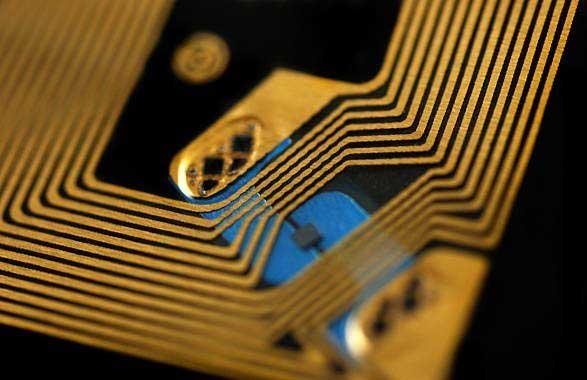Do you have a medical design needing a low-cost, short-range wireless solution for preventing disposable part reuse and counterfeiting? Do you need a radio-frequency identification (RFID) reader capable of reading RFID passive tags but are frustrated by the high cost of an OEM RFID Reader module?
For many high volume medical devices, a pre-certified RFID module can be cost-prohibitive
RFID TECHNOLOGY
![]() RFID technology can be divided into three groups: 125 kHz low-frequency (LF), 13.56 MHz high-frequency (HF) and 860-960 MHz ultra-high-frequency (UHF). LF RFID readers are inexpensive but the LF passive tags are large, bulky and expensive (95 cents). HF RFID readers are slightly more expensive than LF RFID, but the HF passive inlay tags are small, thin, relatively cheap (13 cents) and support anti-counterfeiting measures. UHF readers are expensive ($150) and require RF design techniques, but the UHF passive tags are small, low cost (10 cents) and support sophisticated anti-counterfeiting measures.
RFID technology can be divided into three groups: 125 kHz low-frequency (LF), 13.56 MHz high-frequency (HF) and 860-960 MHz ultra-high-frequency (UHF). LF RFID readers are inexpensive but the LF passive tags are large, bulky and expensive (95 cents). HF RFID readers are slightly more expensive than LF RFID, but the HF passive inlay tags are small, thin, relatively cheap (13 cents) and support anti-counterfeiting measures. UHF readers are expensive ($150) and require RF design techniques, but the UHF passive tags are small, low cost (10 cents) and support sophisticated anti-counterfeiting measures.
RFID SELECTION
Near-field Communication (NFC) is a branch of 13.56 MHz HF RFID technology and was designed for secure data exchange. For embedded medical applications, a 13.56 MHz NFC RFID reader provides all the security and anti-counterfeiting features needed to prevent disposable part reuse and counterfeiting in a low-cost, short-read-range solution.
Because a RFID reader is an intentional radio transmitter, it must be certified by the FCC in the United States (if selling outside the US, you may also need IC in Canada and RED in the EU). Many organizations are leery of the time, effort and cost of obtaining certifications for a custom embedded RFID reader design and instead will opt for an OEM RFID module that has already been certified. Unfortunately, the over $100 price of a pre-certified module is cost-prohibitive for many embedded devices.
LOW-COST RFID DESIGN SOLUTION
![]() low-cost alternative to a pre-certified RFID module is a custom RFID reader design using a PCB trace coil antenna. It turns out that obtaining an FCC certification for a custom RFID reader is not that difficult or costly. Tensentric recently completed a custom embedded NFC RFID reader for a handheld medical device with a RFID circuit BOM cost of only $3.13 in quantity. The RFID reader was used authenticate and enforce single use of a medical disposable that was equipped with a 13.5 x 21mm RFID inlay tag. The RFID reader circuit, including the PCB coil antenna, fit in a 10mm x 30mm area on the PCB. Since the custom design only needed a 10mm read range, Tensentric was able to shrink the coil antenna down to only 7mm x 12mm.
low-cost alternative to a pre-certified RFID module is a custom RFID reader design using a PCB trace coil antenna. It turns out that obtaining an FCC certification for a custom RFID reader is not that difficult or costly. Tensentric recently completed a custom embedded NFC RFID reader for a handheld medical device with a RFID circuit BOM cost of only $3.13 in quantity. The RFID reader was used authenticate and enforce single use of a medical disposable that was equipped with a 13.5 x 21mm RFID inlay tag. The RFID reader circuit, including the PCB coil antenna, fit in a 10mm x 30mm area on the PCB. Since the custom design only needed a 10mm read range, Tensentric was able to shrink the coil antenna down to only 7mm x 12mm.
The cost for FCC testing and certification of the RFID reader was $7,500. The FCC testing took 3 weeks to complete and an FCC grant was issued after submitting a technical documentation package to the FCC-recognized Telecommunication Certification Body (TCB) reviewer. Assuming a production volume of 1,000 devices per year, a custom RFID reader design can save over $96K each year compared to an OEM RFID module. The additional $7,500 cost of the FCC certification for the custom RFID reader pays for itself after only 78 devices.
SUMMARY
- A near-field communication RFID reader provides all the security and anti-counterfeiting features needed to prevent disposable part reuse and counterfeiting in a low-cost, short read-range solution.
- Obtaining an FCC certification for a custom RFID reader is not that difficult or costly.
- Assuming a production volume of 1,000 devices per year, a custom RFID reader design can save over $96K each year compared to an OEM RFID module.
- The additional $7,500 cost of the FCC certification for the custom RFID reader pays for itself after only 78 devices.
Tensentric is a team of highly experienced engineers developing a wide range of medical devices and in vitro diagnostic systems. Tensentric has completed over 300 development projects for clients in the medical device and IVD space since the company’s inception in 2009 and is ISO 13485:2016 certified for design and manufacturing. With capabilities for BSL-2 lab use, manufacturing process development, rapid prototyping, human factors validation and consulting, and in-house design for injection molding expertise, Tensentric is uniquely suited to a wide variety of medical device design, development, and manufacturing application

